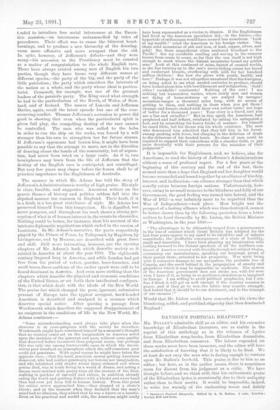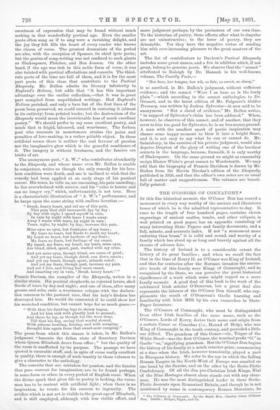DAVISON'S POETICAL RHAPSODY.*
Mn. BULLEN'S admirable skill as an editor, and his extensive knowledge of Elizabethan literature, are as visible in the reprint of this anthology as in the volumes of Lyrics. from Elizabethan song-books, from Elizabethan dramatists, and from Elizabethan romances. The labour expended on these works must have been immense, and the editor will have the satisfaction of knowing that it is likely to be final. We at least do not envy the man who is daring enough to venture upon Mr. Bullen's freehold. This praise is due to him as an editor; but here, as in the earlier issues, there is sometimes room for dissent from his judgment as a critic. We have thought before, and we think still, that his enthusiastic praise of the Elizabethan lyrics is occasionally due to their antiquity rather than to their merits. It would be impossible, indeed, to write too warmly of the enchanting music and dainty * Davison'e Poetical Rhapsody. Edited by A. H. Bullen, 2 vols. London : George Bell and Bons. sweetness of expression that may be found without much seeking in that wonderfully poetical age. Even the smaller poets often sang as if to sing were a ravishing delight, and the joy they felt fills the heart of every reader who knows the charm of verse. The greatest dramatists of the period are also, with the exception of Spenser, its chief lyric poets ; but the genius of song-writing was not confined to such giants as Shakespeare, Fletcher, and Ben jonson. On the other hand, if the age was rich in this noble form of verse, it was also tainted with poetical affectations and conceits. The third- rate poets of the time are full of them, and it is for the most part poets of this class that contribute to the Poetical Rhapsody. Mr. Bullen admits its literary inferiority to .England's Helicon, but adds that " it has this important advantage over the earlier collection,—that it was in great part compiled from unpublished writings. Had England's Helicon perished, and only a bare list of the first lines of the poem been preserved, we could succeed in restoring it (almost in its entirety) from printed books ; but the destruction of the Rhapsody would mean the irretrievable loss of much excellent poetry." We should prefer to say some excellent poetry, and much that is frigid, laboured, and wearisome. The forlorn poet who recounts in monotonous strains the pains and penalties of love-making, is a rather pitiable object, In these artificial verses there is neither the real fervour of passion nor the imaginative glow which is the graceful semblance of it. The imagery is without freshness, and the fancies are tricks of art.
The anonymous poet, "A. W.," who contributes abundantly to the Rhapsody, and whose name even Mr. Bullen is unable to conjecture, writes as though the only remedy for his love.
lorn condition were death, and one is inclined to wish that the remedy had been applied at an early stage of his poetical career. His tears, he tells us, are unceasing, his pain unending ; he lies overwhelmed with sorrow, and his "voice is hoarse and can no longer cry," which, unfortunately, is not true. Here is a characteristic illustration of " A. W.'s " performance, and he harps upon the same string with endless iteration :— " Break, heavy heart, and rid me of this pain,
This pain that still increaseth day by day : By day with sighs I spend myself in vain, In vain by night with tears I waste away. Away I waste with tears, by night in vain : Tears, sighs, by night, by day, increase this pain.
Mine eyes no eyes, but fountains of my tears ; My tears no tears, but floods to moist my heart ; My heart no heart, but harbour of my fears ; My fears no fears, but feelings of my smart.
My smart, my fears, my heart, my tears, mine eyes, Are blind, dried, spent, past, wasted with my cries.
And yet mine eyes, though blind, see cause of grief ; And yet my tears, though dried, run down amain; And yet my heart, though spent, attends relief ; And yet my fears, though past, increase my pain. And yet I live, and living feel more smart, And smarting cry in vain, ' Break, heavy heart !' " Francis Davison, the compiler of the Rhapsody, writes in a similar strain. His poetical shepherds, as rejected lovers, shed floods of tears by day and night; and one of them, after many groans and sobs, ends a wearisome eclogue with the declara- tion common to the pastoral race, that his lady's disdain has destroyed him. He would die contented if lie could show her his wretched condition, but cannot hope for so much grace:—
"With that his fainting legs to shrink begun,
And let him sink with ghastly look to ground; And there he lay, as though his life were done,
Till that his dog, seeing that woeful stound, With piteous howling, kissing, and with scraping,
Brought him again from that sweet-sour escaping."
The poem from which this stanza is taken, in Mr. Bullen's judgment " laments the fallen state of Secretary Davison whom Queen Elizabeth drove from office ; " but the quality of the verse is unaffected by its purpose. The passage we have quoted is execrable stuff, and, in spite of verse really excellent in quality, there is enough of such inanity in these volumes to give a character to the anthology.
The conceits that are mistaken for passion, and the fancies that pass current for imagination, are to be found perhaps, in some form or other, in every period of English verse. When the divine spark that gives life to poetry is lacking, the verse- man has to be content with artificial light; when there is no inspiration, he trusts for his success to ingenuity. The artifice which is not art is visible in the great age of Elizabeth, and is still employed, although with less visible effort, and more judgment perhaps, by the poetasters of our own time. To the historian of poetry, these efforts after what is singular are not uninstructive ; to the lover of poetry, they are detestable, Yet they have the negative virtue of sending him with ever-increasing pleasure to the great masters of the art.
The list of contributors to Davison's Poetical Rhapsody includes some great names, and a few in addition which, if not great, belong to genuine poets. We observe that the " sonnet " attributed to Raleigh by Dr. Hannah in his well-known volume, The Courtly Poets,— "Her face, her tongue, her wit, so fair, so sweet, so sharp," is so ascribed, in Mr. BulIen's judgment, without sufficient evidence ; and the sonnet " Were I as base as is the lowly plain "—which according to the sonnet anthologies, to Dr. Grosart, and to the latest edition of Mr. Palgrave's Golden Treasury, was written by Joshua Sylvester—is now said to be anonymous. "Not a shred of evidence," Mr. Bullen writes, " in support of Sylvester's claim has been adduced." When, however, he observes of this sonnet, and of another, that they seem to him too good for Sylvester, he is on less secure ground. A man with the smallest spark of poetic inspiration may chance some happy moment to blow it into a bright flame, and it is not easy to say what he can or cannot do. Mr. Saintsbury, in the exercise of his private judgment, would also deprive Drayton of the glory of writing one of the loveliest sonnets in the language, because, forsooth, it is only worthy of Shakespeare. On the same ground we might as reasonably assign Blanco White's great sonnet to Wordsworth. We may add that the biography of Francis Davidson is drawn by Mr. Bullen from Sir Harris Nicolas's edition of the Rhapsody, published in 1826, and that the editor's own notes are as usual full of matter and suggestiveness. The volumes are beauti- fully printed.



































 Previous page
Previous page